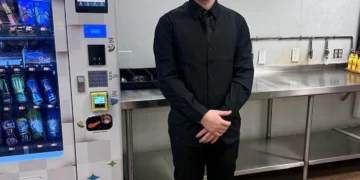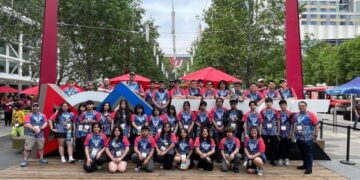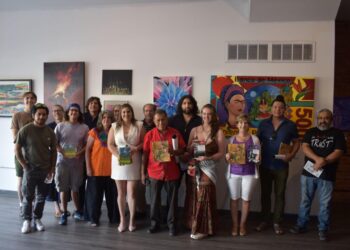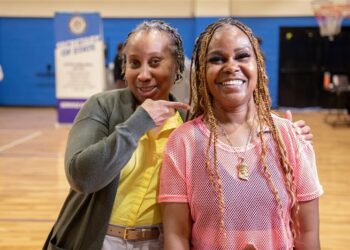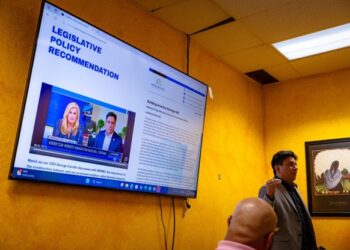Every year, the Disability Policy Seminar (DPS) gathers the nation’s leading disability advocate organization professionals and people with lived experience, in Washington D.C. The goal is to encourage unity and present in front of Congress, the high – priority concerns of people with Intellectual or Developmental Disability (IDD) and their supporting communities.
This year’s annual federal legislative conference was held at the Westin Hotel in downtown Washington DC in early April. The DPS partners with non-profit organizations across the United States of America like The Arc, Autism Society, American Association on Intellectual and Developmental Disabilities, United Cerebral Palsy, Self-Advocates Becoming Empowered, TASH and state LEND programs across the USA and more.
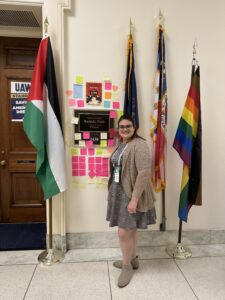
My position as Public Relations Chairperson of Self Advocates of Michigan and a MI-LEND trainee allowed me the opportunity to attend this year’s conference. Being four years into my self-advocacy journey, this is the first time I have travelled outside of Michigan to learn more about the current laws and policies affecting the way people with disabilities live in the United States. Having had my first seizure at the age of 16 and being undiagnosed until I was 25 years, I lived for almost a decade without the required written diagnosis that would allow me to have accommodations that could increase my quality of life.
While living in denial of my body’s physical and psychological limitations, I had not realized that there were people in our society that value the firsthand experience of people with disabilities and put in tremendous efforts to ensure that they have access to quality housing, education, voting and legal rights, health insurance, transportation, employment opportunities and countless more topics that constitute basic human rights.
For this trip my highest priority was The Autism CARES act, whose funding needs to be reauthorized by September 30, 2024. The Autism CARES act is the most comprehensive federal law addressing the needs of all individuals with autism and other neurodevelopmental disabilities. This law funds programs such as the Centers for Disease Control and Prevention’s Learn the Signs, Act Early program and all 60 LEND (Leadership Education in Neurodevelopmental and Related Disabilities) programs. Being neurodivergent and diagnosed as an adult, I value the importance of empowering our communities to learn the early signs of IID and equip them with tools necessary to improve the quality of life across the lifespan of the individual. Learn the Signs Act Early, provides parents, caregivers, healthcare providers and early childhood educators with materials and resources to track the developmental milestones of children 2 months to 5 years old. They provide a step-by-step guide on what to do if you have concerns about your child’s development. All resources are also available in Spanish.
As a MI-LEND training program fellow, I have been provided, a two-semester interdisciplinary training with the goal of improving the health of infants, children and adolescents with or at risk for neurodevelopmental disabilities. This was the first professional cohort model where I was told that my lived experience counted as a discipline and was just as valuable as the disciplines of my fellow PhD and med school student trainees. This is something that all people with disabilities should be told and believe. Disabilities exist in all cultures, religions and income levels across the planet. Disability is not a bad word!
The conference was organized as a mix of general sessions, state caucus meetings and breakout session workshops. We prepared for Wednesday’s Hill Day visit with workshops, including Addressing the Direct Care Workforce Crisis, Advancing Disability Protection in the Criminal Legal System, How to Defund and Advocate for Federal Funding for People with Disabilities and Telling Effective Stories with RespectAbility.
In alignment with the seminar’s mission of providing inclusivity, there was a quiet room available for all attendees who needed to disconnect from the overstimulation of their senses. I made it a point to stop for literature and conversations at all the information tables. The Autism Society distributed sensory kits and recorded video interviews with people with lived experience. I took this opportunity to do my interview in English and Spanish. We need more representation of the Latinx and Spanish speaking disabled population.
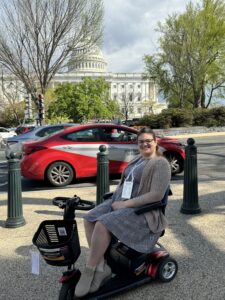
Appointments were made for over 300 attendees to meet with their Congressional Representatives to speak to them directly and/or their staff and drop off information packets. A group of five of us, in and around the 12th District, were scheduled to meet with Representative Rashida Talib. Having seen her in public spaces in Southwest Detroit, I was thrilled to meet her in her office in Washington D.C. Her staff was very welcoming and engaged us in conversation while we waited to see her. After being welcomed into her office she gave us a little over 40 minutes of her time, attentively listening to our concerns, taking notes, and engaging in impactful conversation about the importance of our visit and advocacy work. She took the time to take pictures with us and thanked us for our visit. Afterwards, our small self-guided tour of the Capital cemented in the importance of the Advocacy work on this bi-partisan issue we set out to accomplish. This trip proved to be very empowering and further motivates me to keep advocating and bringing what I learn back to my community.



